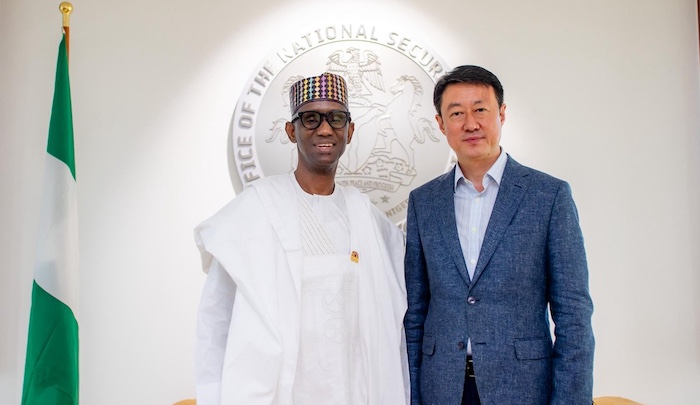
China has reaffirmed its commitment to supporting Nigeria in the fight against terrorism and maintaining national stability. Yu Dunhai, the Chinese ambassador to Nigeria, made this known in a statement shared on X after meeting with Nuhu Ribadu, Nigeria’s National Security Adviser.
The ambassador said China firmly backs the Nigerian government’s development path, emphasising that it aligns with Nigeria’s national realities. Dunhai also criticised any external interference in Nigeria’s internal affairs under the guise of religion or human rights, describing such actions as unwarranted. He reiterated China’s stance against sanctions or the use of force to influence sovereign nations, adding that Beijing remains committed to strengthening security cooperation with Abuja.
“As a comprehensive strategic partner of Nigeria, China firmly supports the Nigerian government in leading its people to a development path that fits Nigeria’s national realities,” Dunhai said. “We oppose any country’s interference in other countries’ internal affairs under the pretext of religion and human rights.
We oppose the wanton threat of sanction and use of force. China is willing to continue supporting Nigeria in combating terrorism and maintaining domestic stability.”
In a related development, China’s foreign ministry spokesperson, Mao Ning, issued a warning against external interference in Nigeria’s affairs during a press briefing in Beijing. Her remarks followed threats by former US President Donald Trump, who asked the US Department of War to prepare for possible military action in Nigeria over alleged persecution of Christians.
Trump also announced Nigeria’s redesignation as a “Country of Particular Concern” and urged the Nigerian government to act swiftly to end what he described as the “killing of Christians.”
Before his comments, several US lawmakers had called on Secretary of State Marco Rubio to take diplomatic action against Nigeria over alleged religious persecution.
The Nigerian government has consistently denied allegations of Christian genocide, maintaining that the country’s security challenges stem from terrorism and criminality rather than religious persecution.
Erizia Rubyjeana



